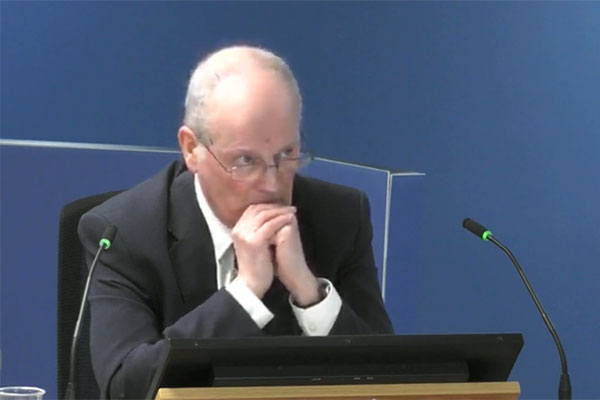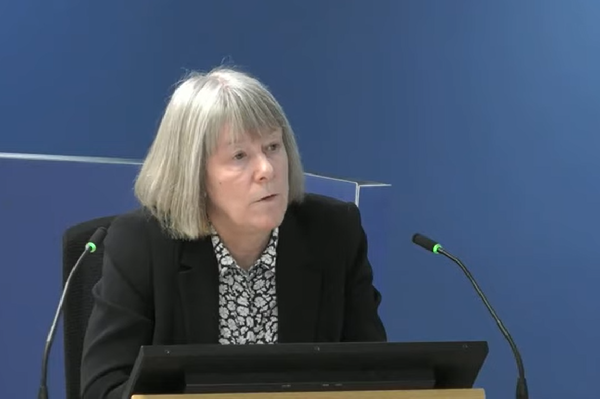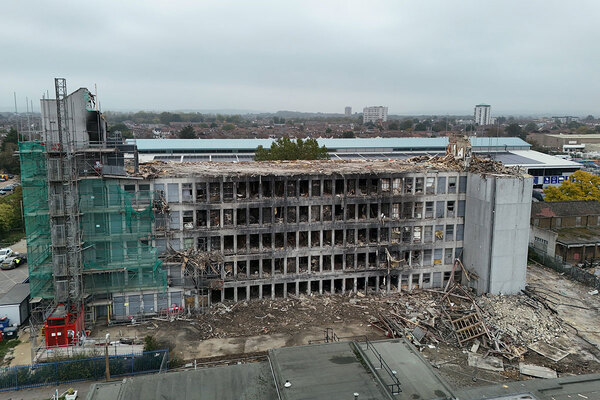You are viewing 1 of your 1 free articles
Government considered scrapping building control entirely as part of red tape review
The government considered scrapping building control and relying on private insurers to maintain standards in the construction industry as part of its so-called ‘Red Tape Challenge’, the Grenfell Tower Inquiry has heard.

The details emerged as Bob Ledsome, deputy director of building regulations between 2011 and 2018, gave evidence on Wednesday.
A briefing pack was compiled by his division ahead of junior minister Andrew Stunell’s appearance at a meeting with Oliver Letwin, who was leading the Cabinet Office’s red tape challenge in May 2012.
Mr Stunell was set to be quizzed by Mr Letwin about regulations that could be ditched by the department at his ‘star chamber’, named after the powerful royal court of the Tudor era.
The briefing pack, developed by civil servants for Mr Stunell, gave ministers options on ways to cut ‘red tape’ and one option presented was to entirely scrap building control.
The briefing said: “Is there anything else we could scrap or amend eg introduced radical ideas like insurance to replace building control?”
It added that other measures could include greater reliance on insurance and “more self-regulation by extending self-certification”. It warned such steps could have “significant downsides”.
Asked if the proposals caused him concern, Mr Ledsome said: “No, because we were asked, quite rightly so, to think broadly about options for ministers to consider…
“We were doing our job of providing ministers with the widest range of issues and options for them to think about.”
Mr Ledsome was grilled throughout the day about the review of Approved Document B, which provides guidance on building regulations covering fire safety, that was supposed to be carried out following the Lakanal House fire in 2009 when six people died.
After an inquest concluded in March 2013, the coroner made a series of recommendations, which were later not implemented by the government. One of the proposals was to make the approved document easier to digest as it was “a most difficult document to use”.
Then-communities secretary Eric Pickles agreed to review Approved Document B in response to the recommendations.
He said: “I can assure you that my department is committed to a programme of simplification.
“However, the design of fire protection in buildings is a complex subject and should remain to some extent in the realm of professionals.”
Mr Pickles also said a new version of Approved Document B would be published by 2016-17.
Mr Ledsome agreed that the letter sent by Mr Pickles in response was “ambiguous as to whether the recommendation was accepted in full”.
“Looking at it now, yes,” he said.
It also emerged that a year after Mr Pickles’ letter, Brian Martin, the civil servant responsible for official guidance on fire safety at the time, said there was “not an absolute commitment” to a review of the approved document.
Referring to the commitment to publish a new version of Approved Document B, he wrote in an email in 2014: “We’ve repeated this line a couple of times since. It is not an absolute commitment.”
Lead counsel to the inquiry Richard Millett QC asked: “What did you understand Brian Martin to mean when he said it’s not an absolute commitment?”
Mr Ledsome said he “did not know why” Mr Martin would have said that because “there was a commitment” from the communities secretary.
“Were you not concerned to discover that Mr Martin did not regard the commitment that had been made to the coroner in his letter by Eric Pickles as absolute?” asked Mr Millett.
“I can’t comment on why Mr Martin used that term. All I can say is that in all of the discussions that we were having at that time and subsequently we were very, very conscious of the timeframe which had been set out in the secretary of state’s response,” said Mr Ledsome.
The inquiry saw Mr Martin said in his witness statement that as an election was due in 2015, “another government would be in power and would not be bound by the commitments of a previous administration”.
Mr Ledsome said he could understand the reasoning, but added: “It would have been unlikely that a new government would have said, ‘oh, we’re going to completely ignore this recommendation and do something completely different’.”
Asked about the timescale of finishing the review of Approved Document B, which was aimed for 2016-17, Mr Millett asked if Mr Ledsome had “lost sight of the fact that what the coroner wanted was a response which went to life safety”.
He said: “You allowed yourself to be overwhelmed and distracted by the complexity and the size of the task and lost sight of the fact that, in fact, what the coroner wanted was a response which went to life safety.”
Mr Ledsome said: “I do not accept that we lost sight of life safety. I do accept that we should have thought is there an option to do something sooner?
“Yes, I accept that and I regret that perhaps we should have given it more attention and we didn’t.”
Mr Ledsome was also asked about the government’s regulatory ‘one in, one out’ policy that was implemented in 2011, was extended to ‘one in, two out’ in 2013 and then ‘one in, three out’ in 2016.
The policy meant a cost analysis had to be undertaken of any new regulations, with the equivalent cost removed from existing regulations before it was implemented. There was no exemption from building regulations from these rules.
Asked if the response to the Lakanal coroner’s inquest would have been caught by this rule, Mr Ledsome said: “If we had come forward with a new version of Approved Document B, then in my view we would have had to have gone through that one in one out challenging process.”
Mr Millett asked: “I think you’re saying that notwithstanding that the review of Approved Document B was pursuant to a coroner’s recommendation accepted by the secretary of state, it would still have been subject to the one in, two and three out principles?”
“I believe so, yes,” Mr Ledsome said.
He also told the inquiry that his division would not have applied for an exemption to building regulations over a concern that it “was a fight worth having”.
Mr Millett asked: “Did you or anybody else in your department ever consider even trying to apply for an exemption for the building regulations? Or the approved documents?
“No, frankly I don’t think we would have got one. Frankly, there is a judgement to be made as to whether it’s a fight worth having,” Mr Ledsome responded.
“Was your pessimism that you described earlier in not even applying [for an exemption] grounded in the assumption that the cost-benefit principle would always trump any consideration of life safety?” asked Mr Millett.
“Well, it certainly would have made the case for change more difficult to achieve,” replied Mr Ledsome.
The inquiry continues with further evidence from Mr Ledsome on Thursday.
Sign up for our weekly Grenfell Inquiry newsletter
Each week we send out a newsletter rounding up the key news from the Grenfell Inquiry, along with the headlines from the week
Already have an account? Click here to manage your newsletters












